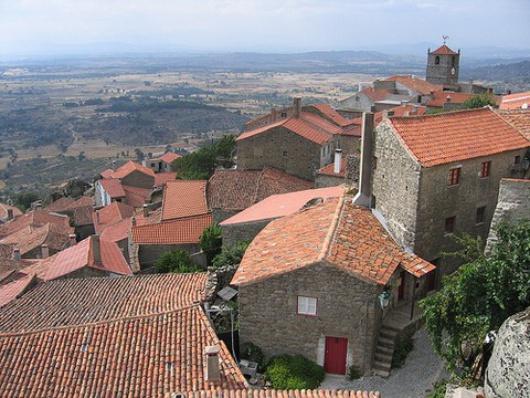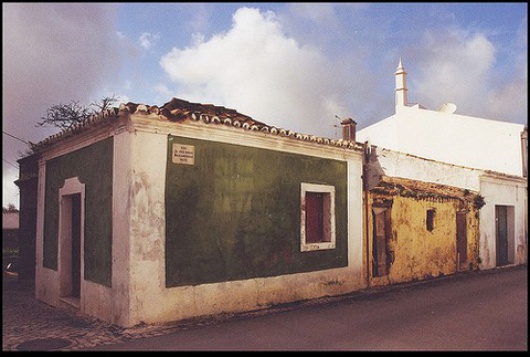Batman, goats and internet in Cavas do Monte, Portugal
Published on
Translation by:
Martyn HawkinsThe living conditions in the north Portuguese mountaintops of S. Pedro do Sul have hardly changed in hundreds of years. Bit by bit, however, the uniting, modernising world is moving in, and the children are moving out

Photo: Monsanto (sukkulaati/ Flickr)
The slate houses of Covas do Monte are nestled into the hollow of the mountain, as if, in the cold winds, they wanted to keep warm together between the lush green mountainsides and the overgrown crag. It’s very quiet here. Suddenly a loud tinny noise pierces through the thin air. It’s Latino beat music wafting through the earthy alleyways. A cat, which had just fallen asleep, slips ungraciously from the speckled fur of a startled goat, which was just serving as its bed. The weekly wagon laden with basic foodstuffs has arrived and is drawing attention to itself with its radio blasting.
Today there’s something different; Covas do Monte has company. There’s a group of young Italians, Germans, Bulgarians and Belgians trampling around between the centuries-old slate walls. They’re spending a week in Portugal, taking part in a youth camp. For today, an excursion to this mountain village is on the programme, where practically everything looks and works like it did 300 years ago. Every morning, two of the 58 inhabitants drive the 2, 500 goats up to the top of the mountain at a time. The others tend to the fields and fruit gardens around the village. With the profits, which come mostly from selling fruit and kids, they buy things that the earth doesn’t produce.
Internet in the goat shed
A good half a year of mechanisation, digitalisation and the increasingly dense networking of the planet have left behind their mark. A goat decorates the sign for the Espaco Internet which hangs above the goat shed with Internet access. The former primary school is now a mixture of a public television room, a village square and a pub. Stuck here and all over the village are Batman stickers. 'Perhaps he lives here,' suggests the group leader, Tiago Marques, without laughing.
Imitating a local myth, the young visitors knock on doors requesting vegetables and bread and so manage to get a look at the insides of the houses. In a strikingly scrubbed-clean kitchen in one of them there is cladding, a gas fireplace and a microwave. Much different to inside a hut, the sight reminds Alberto Cardera from Lisbon of his childhood in Namibia. 'From doing voluntary work in Guatemala I know of something similar too,' says Almut Momsen from Hamburg. But neither of them would have expected that there was still such a thing in Europe. Nothing matches in the crudely equipped kitchen. Damp rises up the stonewalls from the clayey earth floor. The woman of the house shows them around, even into the bedroom, where, on the barely one and a half metre wide mattress only two very thin people, or two people who are very much in love, could find enough space. Her husband says nothing, eyeing the visitors suspiciously.
Return ticket to Paris, please

(Photo: ..joli.../ Flickr)
The couple that stand diagonally opposite the 'restaurant', smiling kindly the whole day, are more talkative. They discuss their first and only getaway into the big wide world. The man didn’t want to go to war for the fascist dictator Salazar, fled on foot over the mountains and got to Paris as a hitchhiker. The woman, his lover from the neighbouring village, followed him. However, he suffered from homesickness. He worked as a day labourer making life in expensive Paris hard so they swapped the view of Pont Neuf and Sacre Coeur for the green mountainsides of Covas do Monte. Their riddled with age but still clearly contoured faces, with attentive, emotion filled eyes show quiet contentment.
They are happy, even if life hasn’t always been easy. There is a lot of envy and jealousy as some have more than others and everyone has less than the people in the cities, especially those in the rest of Europe. They glance over to the plastered houses, which look grotesque set against the cluster of houses in the valley. They are somewhat higher up the mountainside, now towering above in the evening light. The children from these houses have gone to Lisbon to study, and will only come back, perhaps, as visitors. Six young people, who are still here, know that there is somewhere more comfortable to live than on cold clay floors. There, where they are probably only a shop window away from an I-pod on which they can listen to Latino beat-music so much better.
In Covas do Monte the beats have stopped for today. The travelling supermarket has vanished into the darkness, the noise and light now only come from the former primary school, where 36 young Europeans are dunking heavy corn bread into soup, the younger ones drinking fizzy wine, while an old villager constantly and persistently stares above the fireplace, watching the television.
'The visitors are now gleaming with the quite contentment of the villages, but they are quieter than usual. Maybe next time they visit Covas do Monte, there’ll only be a yellow sticker to remind them, that people and goats lived here for hundreds of years until Batman moved in.'
Homepage photo: Böltürük (in Norwegen/ Flickr)
Translated from Batman im Bergdorf



